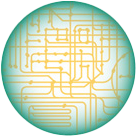03/01/2015
Statistics to Help Optimize Engineered Heterologous Pathways
The Science
For metabolic engineering to reach its full potential, systematic pathway optimization approaches are needed for biofuel production. In previous work, Department of Energy Joint Bioenergy Institute (JBEI) researchers assembled a set of nine heterologous genes in Escherichia coli to produce from glucose the monoterpene limonene, a potential biofuel. While they were able to achieve 435 mg/L of limonene production, they believed further optimization was possible. In a new research article, the JBEI scientists present and demonstrate a computational tool (principal component analysis of proteomics; PCAP) that uses quantitative targeted proteomics data to guide metabolic engineering and achieve higher production of target molecules from heterologous pathways. Counterintuitively, PCAP suggested that an overexpression of the terpene synthase combined with a balanced expression of the remaining enzymes was key to improving limonene production. The PCAP-guided engineering resulted in a more than 40% improvement in the production of limonene and a second valuable terpene. Thus, PCAP could be broadly applied to heterologous pathways for optimized biofuel production.
References
Alonso-Gutierrez, J., E.-M. Kim, T. S. Batth, N. Cho, Q. Hu, L. J. G. Chan, C. J. Petzold, N. J. Hillson, P. D. Adams, J. D. Keasling, H. G. Martin, and T. S. Lee. 2015. “Principal Component Analysis of Proteomics (PCAP) as a Tool to Direct Metabolic Engineering,” Metabolic Engineering 28, 123–33. DOI: 10.1016/j.ymben.2014.11.011.
